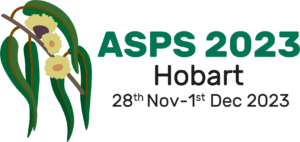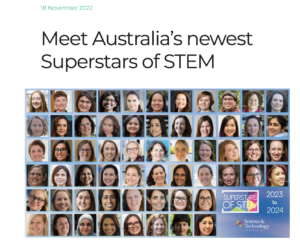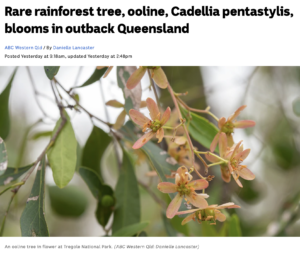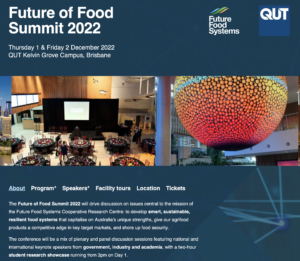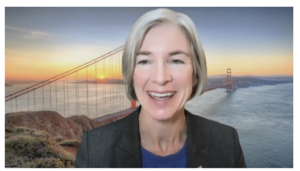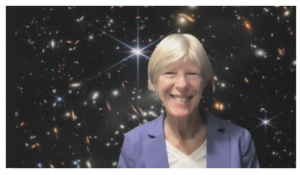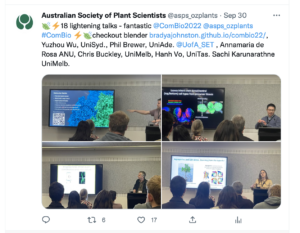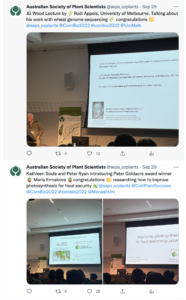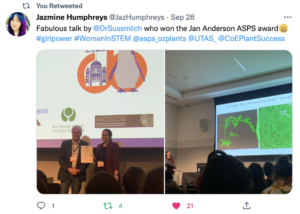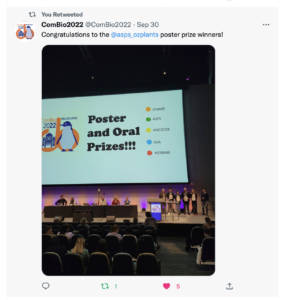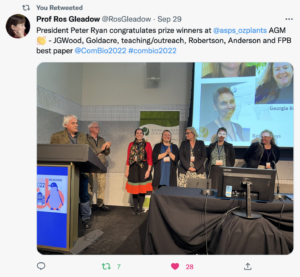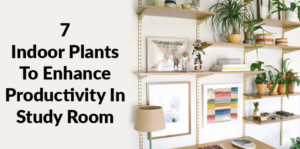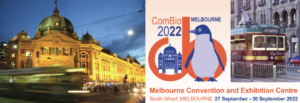- About
- Members
- Join
- Member log in
- Membership Renewal
- Member directory
- Life Members
- ASPS Life Member Professor Graham Farquhar
- ASPS Life Member Associate Professor Hendrik (Hank) Greenway
- ASPS Life Member Dr Marshall (Hal) D Hatch
- ASPS Life Member Dr Paul E Kriedmann
- ASPS Life Member Dr Mervyn Ludlow
- ASPS Life Member Emeritus Professor Rana Munns
- ASPS Life Member Conjoint Professor Christina E Offler
- ASPS Life Member Professor (Charles) Barry Osmond
- ASPS Life Member Emeritus Professor John W Patrick
- ASPS Life Member Dr Joe Wiskich
- Corresponding Members
- Elected Fellows
- Events
- Awards & Funding
- Employment
- Publications
- Research
- Teaching
- Menu
December Phyogen and deadline for International Botanical Congress symposium proposals
21 December 2022
Dear colleagues,
The December issue of Phytogen is out now and can be accessed HERE.
This is also a reminder that the deadline for submitting symposium proposals for the International Botanical Congress (IBC).
Two years ahead of the XX IBC, we are pleased to launch the Call for Symposia. We encourage researchers worldwide to submit symposium proposals on a variety of topics through the IBC website. The call for symposia will remain open until December 30th, 2022. Symposia constitute a very important component of the XX IBC, please submit a proposal and help shape the meeting’s program! Also note that diversity of speakers in terms of gender, career stage, and geography will be one of the criteria for selecting proposals. Symposium proposals that bridge two or more of the 31 proposed topics, including novel views and/or multi-disciplinary research perspectives, are especially encouraged.
Best regards,
The Organizing Committee of the XX IBC.
Call for symposia
Proposal submission now available! The scientific committee will evaluate symposium proposals based on potential audience interest, scientific quality, and diversity of speakers in terms of gender, career stage, and geography, among others. Symposium proposals that bridge two or more of the 31 proposed topics, including novel views and/or multi-disciplinary research perspectives are especially encouraged. We will make an effort to accept as many proposals as possible. Each symposium will last for 2 hours and will consist of six 20-minute oral communications (15 min presentations + 5 min Q&A). To maximize the interchangeability of participants among concurrent symposia, changes to this schedule will not be allowed. Deadline for symposium proposals 30 December 2022. Proposal Submission
Topics
|
1. Agroforestry Systems |
2. Bioinformatics |
3. Biogeography / Phylogeography |
|
4. Botanical History |
5. Bryology |
6. Comparative Genomics / Transcriptomics |
|
7. Conservation Biology |
8. Crops and Wild Relatives |
9. Development and Structure |
|
10. Ecology and Plant Communities |
11. Ecophysiology |
12. Education and Outreach |
|
13. Ethnobotany |
14. Floristics |
15. Functional Genetics |
|
16. Global Change Ecology |
17. Hybrids and Hybridization |
18. Mycology and Lichenology |
|
19. Macroevolution |
20. Paleobotany / Archaeobotany |
21. Phycology |
|
22. Phylogenetics and Phylogenomics |
23. Physiology |
24. Plant, Animal, and Microbe Interactions |
|
25. Plant Biotechnology |
26. Palynology |
27. Population Genetics |
|
28. Pteridology |
29. Restoration Ecology |
30. Reproductive Biology |
|
31. Systematics |
|
|
Prof Martha Ludwig (she/her)
Head of School
School of Molecular Sciences • +61 8 6488 3744 / +61 8 6488 4699
December 2022 Phytogen
16 December 2022
Welcome to Phytogen for December 2022
Below are reports from some of our award recipients in 2022. Over the summer break we hope you can recharge and be inspired to submit applications for when awards open in January 2023.
There is also … a save the date for ASPS 2023!!!
Please add yourself to our conference mailing list and help us during the planning stages by filling out our ASPS2023 EOI form: https://forms.gle/osUAvNEyn9jcwtw78
Please share widely with your colleagues and students.
Jan Anderson Award, Frances Sussmilch, University of Tasmania.
My research focusses on the similarities and differences that can be seen in the functions of related genes between diverse plant lineages. I began my research career investigating the genes that regulate flowering in garden pea (Pisum sativum) with Assoc. Prof. Jim Weller’s group at the University of Tasmania. My PhD research left me impressed by the impact that a single nucleotide change in a key gene can have on plant phenotype1, and how useful in-depth knowledge of gene function in one model plant species can be as a starting point for understanding the roles of related genes in other species. As an early postdoc, I worked across three different research groups using molecular biology to address quite disparate research questions relating to i) the genetic control of flowering time and inflorescence architecture in legumes, ii) the evolution of genes controlling stomatal closure in land plants with Asst. Prof. Scott McAdam and Prof. Tim Brodribb, and iii) the diversity of orchid mycorrhizal fungi in Australia with Dr Nigel Swarts. This gave me the opportunity to make valuable contributions to projects that I wouldn’t have initially thought were within my wheelhouse through collaboration with experts in these different fields. Highlights included characterising the genes affected in mutants that had been studied for decades, allowing this wealth of accumulated knowledge to be drawn together to better understand how the affected genes normally function in plant growth and development, including a pea flowering time/photoperiod response mutant2, a fern abscisic acid signalling/sex determination mutant3, and a pea auxin biosynthesis/leaf venation mutant4. Since then, I’ve enjoyed learning new techniques to investigate the evolutionary history of genes known to control angiosperm stomatal opening and closure and the functionality of related genes in diverse extant plant groups, including abscisic acid biosynthesis and signalling genes e.g. 5-8, and ion channels9, 10. I have been fortunate to have been supported by funding from the German Academic Exchange Service (DAAD) and Australian Research Council DECRA and Discovery schemes, and collaborating as an Associate Investigator within the ARC Centre of Excellence for Plant Success in Nature and Agriculture, enabling me to study fascinating aspects of plant biology and work with some great researchers in the process. It is an incredible honour to be recognised by ASPS with the 2022 Jan Anderson Award, and exciting to think about what discoveries in plant science may yet be to come.
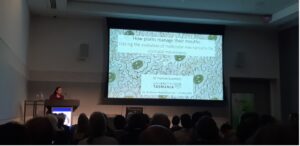
Jan Anderson Award Lecture at ComBio2022. Photo credit: Dr Akila Wijerathna-Yapa.
References
- F. C. Sussmilch et al., Plant Cell 27, 1046-1060 (2015).
- S. Ridge et al., Plant Cell 28, 2545-2559 (2016).
- S. McAdam et al., Proc. Natl. Acad. Sci. U. S. A. 113, 12862–12867 (2016).
- S. A. M. McAdam et al., Plant Physiol. 175, 351-360 (2017).
- S. A. M. McAdam, F. C. Sussmilch, T. J. Brodribb, Plant Cell Environ. 39, 485-491 (2016).
- F. C. Sussmilch, T. J. Brodribb, S. A. M. McAdam, J. Exp. Bot. 68, 2913-2918 (2017).
- F. C. Sussmilch et al., Trends Plant Sci. 24, 342-351 (2019).
- F.-P. Zhang et al., J. Exp. Bot. 69, 1261–1267 (2018).
- I. Dreyer et al., Trends Plant Sci. 26, 41-52 (2021).
- F. C. Sussmilch, M. R. G. Roelfsema, R. Hedrich, New Phytol. 222, 84-90 (2019).
Hank Greenway Award for Education and Outreach: Adelaide University National Science week team: Megan Shelden, Georgia Koerber, Beth Loveys.
Our team was honoured to be awarded the Education and Outreach Award for our delivery of a successful Science Week event in 2021. We presented the award lecture in the Education Symposium stream of the conference; our presentation was titled: Plant Science: Safeguarding our Future Food Security.
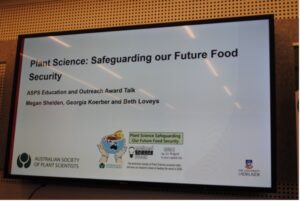 |
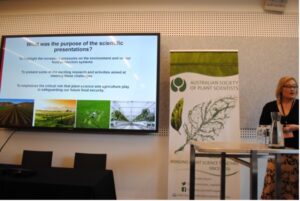 |
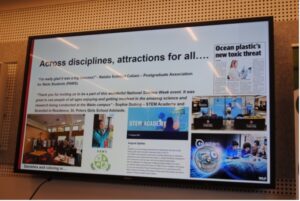 |
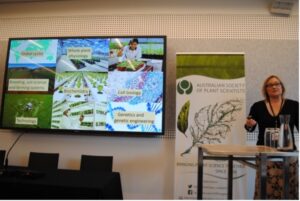 |
Photos of our award talk.
There was a full day of Education focused conference presentations from educators in fields of biochemistry, molecular biology, plant science, cell biology and genetics. It was great to see the fantastic approaches that people were taking to improve tertiary science education for students. Some of the highlights of the Education sessions are described below.
Dr. Saw Hoon from the University of Melbourne described a ground-breaking student-led journal and conference she developed. The journal was inspired by the wonderful essays written by her students as part of the assessment in her course. The essays were so good Saw wanted to give them another life so she decided to create a student-led, peer reviewed journal, “Humans 2.0”. To launch the journal Saw and her students organised a conference to showcase the student work. The student presentations were mixed with those by staff. More can be seen at https://biomedicalsciences.unimelb.edu.au/study/humans2.0
Dr. Anna Galea from UNSW described a student ambassadors’ program which started in biochemistry but is now university wide. Students self-nominate in each course and provide periodic feedback to course coordinators. Students run surveys of their peers, a check in survey early in semester. They also write their own revision questions. https://www.teaching.unsw.edu.au/about-teaching/students-as-partners/student-focus-groups
Dr. James Tsatsaronis from LaTrobe University teaches large classes (approx. 200) of level 2 biochemistry. To manage the class with limited staff he established a program called “Near Peer Mentors”. The near peer mentors were students who had taken the class in the previous year and achieved excellent grades. They allocated 3 small teams of students (5-6) in tutorials where students were working through PBL activities. The near peer mentors supported the junior students, guiding them through the activities that they had themselves done the previous year.
As the students were working in teams part of the assessment was a self and peer evaluation undertaken at the end of each tutorial session. The self and peer evaluation was worth 50% of the tutorial marks. Team structure was not fixed, students were able to select new team members each week (avoiding the problem of students being absent).
There was a student panel discussion where students gave their thoughts and perspectives about online learning during the pandemic. It was very encouraging to see students thriving and prioritizing their mental health.
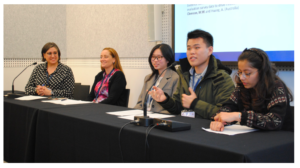
Student led panel discussion.
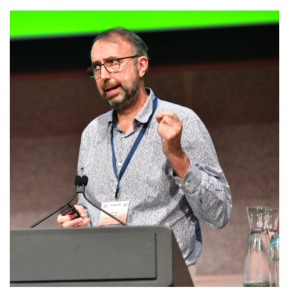
Plenary by Associate Professor Merlin Crosley.
It was fantastic to see an Education focused plenary in the ComBio program this year, Associate Professor Merlin Crosley (DVCA) from UNSW described the challenge of recognising excellence in teaching.
When student experience of learning and teaching at UNSW was analysed, it was apparent that teaching satisfaction scores were higher for Education Specialist staff than standard academics. Prompting the question why do students recognise and value excellence in teaching, but management do not? This observation led to the development of a teaching focused University College, called Scientia Education Academy. By a competitive process, academics were invited to apply for membership of Scientia Education Academy, 40 of the most outstanding educators were selected and celebrated. https://www.education.unsw.edu.au/teaching/scientia-education-academy
|
|
Happy Christmas everyone and have a restful New Year.
Please login and check your ASPS membership is up to date. Encourage your colleagues and students to join ASPS.Tweet to @asps_ozplants your news and upcoming events and follow to keep up to date.
Save the Date for ASPS2023!
15 December 2022
Save the Date for ASPS2023!
Get out your 2023 calendars – we are planning a four-day, in-person, plant science conference in Hobart from 28 Nov – 1 Dec 2023.
Please add yourself to our mailing list and help us during the planning stages by filling out our EOI form: https://forms.gle/osUAvNEyn9jcwtw78
We welcome you to circulate this widely among your networks.
Looking forward to seeing you there,
The ASPS 2023 Organising Committee
Phytogen out now
28 November 2022
November 2022 Phytogen
25 November 2022
Welcome to Phytogen for November 2022. Lots of Prizes and Grant Announcements ! Congratulations everyone and best wishes for those applying next time.
There are announcements for Superstars of STEM, click on the image below to read about the amazing recipients.
Australian Academy of Science held Science at the Shine Dome 2022 during November celebrating induction of Fellows and Honorific Awards for 2020, 2021 and 2022. There are plenty of plant people to celebrate along with all the other recipients in many amazing fields of science. Watch the videos below by clicking on play.
2022:
“All life is dependent on plants, and with the population increasing we had to work out ways to increase food production.” Dr Liz Dennis from CSIRO is working to ensure higher yields can continue beyond a hybrid seeds’ 1st generation, which could have a major impact on food supply.
2021:
Professor Susanne von Caemmerer from ANU. Research from leaf chloroplasts to global models of plant production aimed at enhancing photosynthetic rates in crop plants to increase their yield and adapt to climate change is now applied world-wide.
2020:
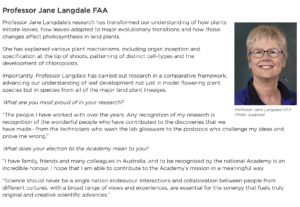
Professor Jane Langdale from Oxford University in the United Kingdom is elected a corresponding member.
The ARC has also announced funding, congratulations to all. Click on the links below for the media releases.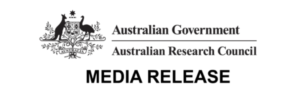
Linkage Infrastructure, Equipment and Facilities 2023,
Discovery Early Career Researcher Award 2023.
Here is an article from the ABC about years with rain and rare flowering of a rainforest tree in western Queensland.
All the best with our changeable climate, contending with hay fever, floods in the east, and extreme heat in the west .
Upcoming Events
Next week is the Future of Food Summit at QUT.
Planning has started for ASPS meeting in Tasmania in 2023 and well underway for IUBMB 2024 in Melbourne.
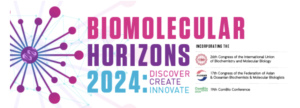
Our President Elect Professor Martha Ludwig would like to share an upcoming Special Issue in Plants: 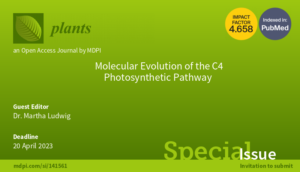
Please login and check your ASPS membership is up to date. Encourage your colleagues and students to join ASPS.
Tweet to @asps_ozplants your news and upcoming events and follow to keep up to date.
October Phytogen 2022
28 October 2022
Welcome to Phytogen for October 2022. Last month was ComBio2022 in Melbourne. Below are some reports by students who received travel awards. We will chase the rest of you up in 2023 or please send reports as you wish. ComBio2022 had many great talks and posters across many disciplines. There are also links below to opening and closing Plenary Talks to enjoy again.
|
|
Opening Keynote Plenary by Professor Jennifer Doudna | ASBMN Grimwade Keynote Plenary by Professor Cynthia Kenyon |
Abi Ghifari, PhD Candidate, School of Molecular Sciences & ARC Centre of Excellence in Plant Energy Biology, The University of Western Australia.
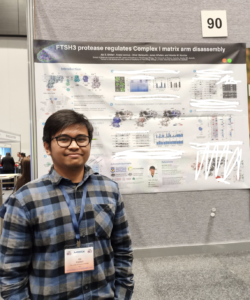
I was grateful to be awarded a travel grant by the Australian Society of Plant Scientists (ASPS) to attend and present my research at ComBio 2022 Conference in Melbourne. ComBio is a combined meeting of five leading Australia and New Zealand societies focusing on all aspects of genetics, plant science, biochemistry, molecular biology, and cell and developmental biology. ComBio 2022 was the first in-person ComBio meeting after the pandemic, which was delayed for two years due to COVID-19 related lockdowns and border closure. As a result, more than a thousand scientists were keen to present and discuss their latest studies face-to-face. I was delighted to present my poster that highlighted the latest results of my PhD project focusing on proteolytic regulation of plant mitochondrial respiratory components. I was so excited to discuss my studies to scientists across multiple disciplines. I was especially delighted to meet and talk with other researchers that work on similar aspects of mitochondria, but on different organisms such as yeast and mammals, including human cell system. I also learned a lot about different scientific approaches to particular problems, particularly in areas of biochemistry and molecular biology that I interested in, such as post-translational modifications, protein homeostasis regulation by ubiquitin-proteasome system, and roles of mitochondria in health and diseases. Overall, I really enjoyed the experience of attending and presenting in such a massive and diverse conference. I encourage future and present graduate students working in all aspects of plant science to join ASPS, which is such as welcoming community for its members.
Linh B. Ton, PhD Candidate, Crop Genomics Group, School of Biological Science, The University of Western Australia.
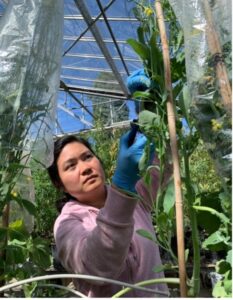
It was my first time attending ComBio2022 thanks to the Travel Grant offered by ASPS and support from my supervisors. ComBio2022 in Melbourne was the first big conference I attended after the pandemic, and I had the privilege of presenting findings from my PhD on designing CRISPR/CasRx system targeting Turnip mosaic virus infecting canola (Brassica napus). It was a far more amazing and friendly environment than I imagined. My first impression is how it was professionally organised, and I had no difficulty in registering for attendance and accommodation booking near the conference venue.
The plenary talks were excellent in providing an overview on the achievements and the on-going studies, motivation and navigation for researchers at different levels of career development. Symposium presentations on cell biology and signalling were also so amazing they expanded my knowledge on the diverse applications of biological and molecular tools in exploring cellular networks. I was very impressed by the research journey leading to the success of the C4 Rice project by Dr Maria Ermakova and other talks about strategies to improve plant productivity. Poster sessions were my chance to catch up with other topics and discussions.
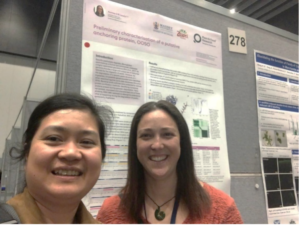
ComBio2022 offered me a great time learning new knowledge beyond my expertise and provided me with the opportunity to come up with new ideas for my PhD project. It also gave me the chance to expand my professional networks, not only within the research community but also extending to scientific services and businesses, where I could find solutions for my experiments.
Hanh Minh Vo, PhD Candidate, Biological Sciences, School of Natural Sciences, University of Tasmania.
ComBio2022 was a fantastic opportunity for a young researcher like myself to present my current project on understanding how plants can rapidly response to dehydration. As the climate gets drier, it is crucial for us to understand what controls stress responses in plants, so we can improve plant tolerance in preparation for the near future.
I used my talk as a conversation starter to tell people about my current experiments and get feedback thereafter. I also talked to new people from various backgrounds on their own projects, both to satisfy my curiosity, and to gather possible ideas for my own research. For example, the work done by Dr. Lim Chee Liew using single-cell RNAseq and the conversation with her gave me some ideas about for my project. Even the opportunity to explore outside of my scope into human and animal research, was amazing. It gave me glimpses into what we have achieved and what I might be able to apply to plant research. Everyone was professional yet friendly and approachable, which is encouraging for new researchers to strike up a conversation.
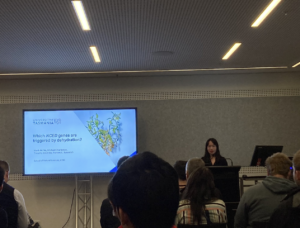
I would like to thank the ASPS for the student travel grant that allowed me to join such a vibrant face-to-face gathering community. I would also like to specifically thank my supervisors Dr. Frances Sussmilch, Prof. Timothy Brodribb and Prof. Michael Charleston for their support throughout my PhD.
Lots of great tweets at @asps_ozplants
Our President Elect Professor Martha Ludwig would like to share an upcoming Special Issue in Plants: 
Wishing students, researchers and teachers all the best for studying and preparations as the year is ending. Some of the plants in this article may help with motivation.
Please login and check your ASPS membership is up to date. Encourage your colleagues and students to join ASPS.
Tweet to @asps_ozplants your news and upcoming events and follow to keep up to date.
ASPS AGM documents
24 September 2022
Dear ASPS Members,
We look forward to seeing many of your at ComBio next week. The ASPS Annual General Meeting will be held during ComBio on Thursday at 6:10 pm and we encourage you to come along. The AGM agenda and various reports are now available on the ASPS website (www.asps.org.au). We are proposing small changes to the constitution which will be voted on at the AGM. These changes can be viewed on the website. Those members who cannot attend the meeting but would like to vote can organise a proxy if they wish. We are asking for nominations to fill vacant positions of the Council so look at the agenda if you are interested and contact our Secretary Kim Johnson. K.Johnson@latrobe.edu.au
Thanks, Peter Ryan
____________________________________
Dr Peter R Ryan
President, Australian Society of Plant Scientists
Honorary Fellow, CSIRO Agriculture and Food
PO Box 1700
Canberra ACT 2601, Australia
Email: Peter.Ryan@csiro.au
Mob: 0468671565
August GPC E-bulletin and Tickets for ASPS dinner during ComBio 2022
01 September 2022
Dear ASPS members,
The Global Plant Council August E-bulletin is can be accessed HERE.
ASPS will hold a dinner for Society members during ComBio 2022 following our AGM on Thursday 29th September.
This will be a two-course dinner including some drinks at Melbourne Public in the Docklands a short walk from the Conference venue.
The ticket prices for members are subsidised by the Society:
Students members for $30
Other members for $60
Additional tickets can be purchased for $90
Tickets are limited, so don’t delay. Book today HERE.
Please indicate any dietary requirements when booking your ticket.
Book ASPS dinner tickets HERE.
August Phytogen, ComBio2022 preparations
25 August 2022
Welcome to Phytogen for August 2022. It is getting closer now to ComBio2022 in Melbourne next month. Below are several wonderful reports from ASPS2021 to inspire your talk and poster preparations for ComBio2022. Also remember to book tickets for our dinner: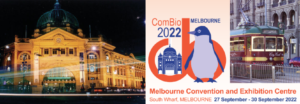
Dear ASPS members,ASPS will hold a dinner for Society members during ComBio 2022 following our AGM on Thursday 29th September.This will be a two-course dinner including some drinks at Melbourne Public in the Docklands a short walk from the Conference venue.The ticket prices for members are subsidised by the Society:Students members for $30Other members for $60Additional tickets can be purchased for $90Tickets are limited, so don’t delay. Book today HERE.Please indicate any dietary requirements when booking your ticket.
Book ASPS dinner tickets HERE.
Here is Simon Williams, one of the organisers of ASPS 2021, ANU. 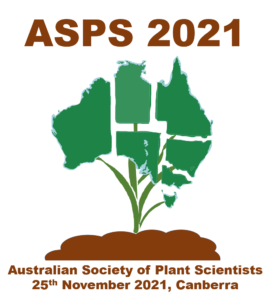
“It was fantastic that, after such a long hiatus, we could organise a meeting that incorporated local face-to-face interaction with a national vibe, via the virtual awards session presentation. A sense of comradery was formed (and welcomed) working across states and territories with motivated, hardworking plant science-ASPS colleagues. The Hybrid-ASPS meeting was a great event for our society, providing an opportunity, particularly for EMCRs, to showcase their important plant science research.”
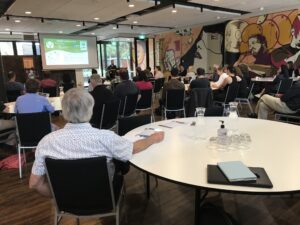
Aaron Phillips, University of Adelaide.
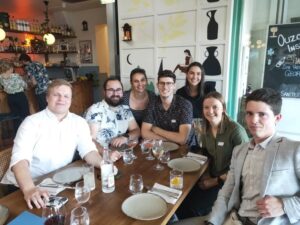
I started my PhD under Professor Rachel Burton in 2019 at the University of Adelaide. Soon after, as the world came screeching to a halt due to the pandemic, there were many uncertainties. Chief amongst them was not knowing when the academic world would resume face-to-face conferences. It seemed like we had to bear the burden of a mostly digital existence for a lifetime. But then an exciting email arrived, letting us know about ASPS2021 – an in-person conference, with nodes operating in all major cities around the country! What a fantastic opportunity this would be for the students of the pandemic to spread the word of their research and finally get some networking under our belts. And we were not disappointed!
ASPS2021 was the first conference I was able to attend during my candidature. This two-day conference really had it all – from understanding sub-cellular processes involved in osmotic stress, to the challenges surrounding growing plants in space, to learning how to be more effective plant science teachers. As this was my first conference, one of the biggest highlights was being able to present and discuss some of my research from the preceding two years. I had the opportunity to present a poster and talk about my work on wild rice (Oryza australiensis) abiotic stress tolerance and genome sequencing. I was incredibly nervous, but I’m so glad to have had this opportunity as I met and had interesting discussions with some wonderful people from other institutions who were able to shed new light on my findings. I value the connections made at ASPS2021 highly and look forward to the next face-to-face event immensely!
Pieter-Willem Hendriks, Charles Sturt University.
How good was it to finally meet people in person again? After two years of Covid19 forced online conferences. The ASPS2021 meeting was my first opportunity to listen in person to other scientists’ presentations and give a presentation on my PhD research. The introduction by president Peter Ryan was genuinely inspiring. He was questioning why plant science may seem to be ignored while it will be so crucial in the next few decades to answer critical questions such as food security for an increased world population combined with climate change challenges.
Besides the possibility of networking with local scientists, it was also an excellent opportunity to present the work from my thesis. It was a highlight to have dinner with senior scientists and receive their constructive observations and questions. This will have helped me set up my thesis’s last year and made me think about how to construct my final discussion.
I enjoyed the scope of the research presented in the morning by fellow researchers. The breadth of presentations went from subcellular structures such as aquaporins all the way to broad field breeding. It was great to see the work and passion of fellow early career and PhD students. I particularly enjoyed the reward talk for the Education and Outreach reward from Dr Kim Johnson and Dr Monika Doblin. Their way of bringing science to young students was inspiring.
Fiona Kang, PhD candidate, School of Biosciences, The University of Melbourne.
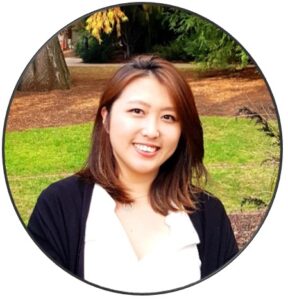
Having the opportunity to speak at the ASPS 2022 Victorian node meeting was experiencing the best of both worlds.
I had the comfort and flexibility of attending an Australia-wide conference at my doorstep, the opportunity to network with the local plant research groups in-person and to tune-in to the major advancements in the field of plant science happening all-across Australia. It would’ve been a technologically mammoth effort pulled by the organisers but as an attendee it was such a rewarding experience after a difficult and isolating pandemic. I had the pleasure of presenting my research, followed up by an invigorating, fruitful discussion that has had an overwhelmingly positive impact on my research. As a co-chair of the student session, I also had so much fun connecting with my fellow graduate students from different universities. We not only spoke about our research but shared stories of our dilemmas and accomplishments to be reminded that we are sharing the graduate study experience together. The ASPS2022 meeting certainly reaccelerated my motivation and passion for research and I look forward to their next conference.
To those of you who has made it this far and is wondering what I do for research, I study plant cell wall biosynthesis in a basal land plant, Marchantia polymorpha. My end goal is to modulate the cell wall sugar composition to better equip plants to tolerate the conditions that is becoming exceedingly unpredictable due to climate change.
Willem Joubert, University of Adelaide.
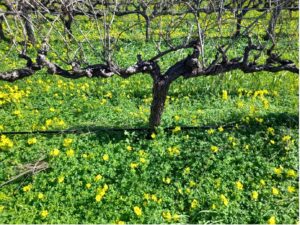
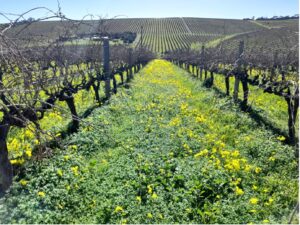
I attended Phytogen in Adelaide 2021 during my final year of completing a Bachelor of Viticulture & Oenology and was lucky enough to present the work undertaken in my honours project in poster form.
Attending the conference allowed me to connect with others in the plant science community, as well as provided me with insight into research being conducted to address issues in industries other than the wine industry.
It was a real privilege to present results from my honours project in poster format, along with a short presentation addressing conference attendees. The experience allowed me to build confidence in communicating the results of my work and the response of other attendees taking an interest in my work was quite uplifting.
I would strongly urge any student to take part in ASPS events if provided with the opportunity. It is a fantastic opportunity get a broader perspective on current and future research being conducted in the field of plant science. Not to mention the great networking opportunities and spectacular food provided by the ASPS!
Kate Johnson, University of Tasmania.
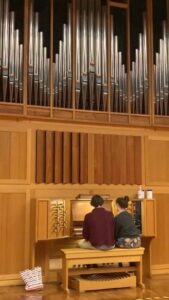
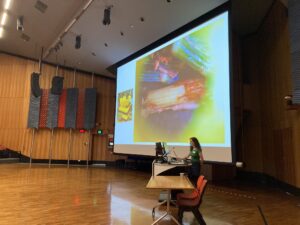
In 2021 members of the plant science community at the University of Tasmania gathered in a lovely lecture theatre (with a pipe organ!) to share our research as part of the ASPS 2021 conference. This was a wonderful experience. The talks were diverse with topics ranging from plant evolution and ecology to physiology, fungi and soil. While conference attendees met in separate groups, in capital cities around the country, we were connected virtually by social media with attendees sharing pictures and updates via Twitter.
I presented research from my PhD on non-invasively tracking drought-induced damage to trees. I did this by attaching a number of cameras to the terminal branchlets of potted trees of drought-resistant Australian species Callitris rhomboidea. These cameras continuously captured images as I dried these trees (and monitored their water stress) to quantify the timing and spread of drought-induced damage across their canopies (here’s the article if you’re interested: https://nph.onlinelibrary.wiley.com/doi/abs/10.1111/nph.17786).
I’ve been lucky enough to attend a number of international conferences and am currently researching in the USA, but I feel that Australia’s plant science research is world-class. With amazing natural and agricultural systems and excellent research facilities, Australian researchers are addressing some of the biggest questions we still have about plants with great expertise and enthusiasm. It was wonderful to see some of this research, much of it led by ECRs, showcased at the ASPS conference. As an ECR, I’d highly recommend that other ECRS (and people at all levels of course) attend Combio2022 and other Aussie conferences!
Rose Zhang, Honours Student, Research School of Biology, ANU.
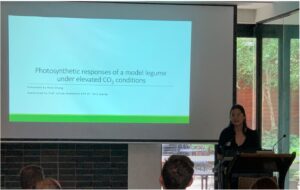
During the third year of my undergraduate degree, I was encouraged by my research project supervisors to submit a talk for the Canberra node of the 2021 Australian Society of Plant Scientists conference. As the only undergraduate student attending the conference, I was a little nervous about presenting in front of so many experienced PhD students and distinguished academics. It turned out that I didn’t need to feel nervous at all as everyone I spoke to was interested and encouraging of my research project! The 2021 ASPS conference was the first large-scale in-person academic event I’d attended since the COVID pandemic, and it was incredibly rewarding to be able to engage and network with others in the plant science community.
The diverse range of speakers during the conference provided me with a chance to learn about the exciting research that was happening all around me. Thanks to the presentations of Dr Samantha McGaughey and Dr Annamaria De Rosa, I learnt all about the amazing world of plant aquaporins and am now working on characterising the function of aquaporins in legumes for my Honours year! Not only did the 2021 ASPS conference provide me with a chance to develop my presentation skills in front of a supportive and engaged audience, but it connected me with academics who later became my Honours supervisors. All in all, I would strongly encourage students at all stages of their scientific careers to attend future ASPS conferences!
Na Sai (Charlotte), University of Adelaide.
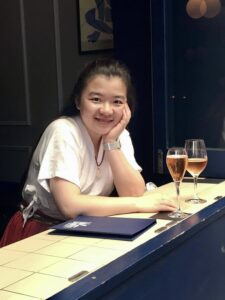
“If computers can take everyone else’s jobs, I am sure it can take one of mine.” This initial thought brings me to the development of StomaAI (SAI) – the AI assisted stomata measuring system for barley and Arabidopsis microscope images. I feel honoured to be the speaker to present part of my PhD work titled “StomaAI: Fast automated quantification of stomatal parameters” at the Australian Society of Plant Scientists (ASPS) 2021. Thank ASPS provide this great platform and chance for me to introduce SAI to the community and hear feedbacks.
The experience at ASPS 2021 was wonderful and unforgettable. I realised how amazing plant science could be through communicating with conference attendees when they told me about their research. The exchange of ideas via these conversations during the breaks and dinner was enriching. I learn new things about other fields that are out of my own research area which are plant stomata with GABA regulation and bioinformatics. I also enjoyed the talks as they are quite interesting and stimulating, and inspired me with new ideas.
ASPS 2021 opens up a fantastic opportunity for networking with great Australian plant scientists and promotes potential collaborations in the community. Thank the ASPS organising committee for making a such delightful event happen.
Shanice Van Haeften, PhD candidate, Queensland Alliance for Agriculture and Food Innovation, University of Queensland.
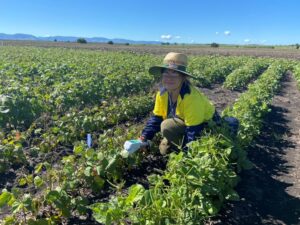
Unfortunately, starting my PhD during the peak of COVID-19 had meant that I was only able to attend conferences and symposiums online. Although this was a great way to hear about research in my field, it also meant that there was not a lot of opportunity to connect and engage with fellow researchers.
The Australian Society for Plant Scientists (ASPS) Conference, held at the Queensland University of Technology in November 2021, was the first in-person event I was able to attend during my PhD. At this conference I was given the opportunity to present my research during their lightening talks session which gave presenters 5 minutes to discuss their work. This experience provided me with the challenge of trying to effectively communicate my research in a concise manner to an audience with a diverse research background. Hearing from others in this session and developing my own talk, I learnt a range of new strategies and techniques on how to share my research in an engaging manner.
Attending this conference was also an amazing opportunity to network with plant scientists from across the region as well as hear about plant science research occurring in other states through the live stream component of the conference. Overall, attending this conference provided a valuable experience to learn and connect with like-minded individuals in the field of plant science as well as gain new insights that are of value to my own research.
Lina Herliana, University of Adelaide.
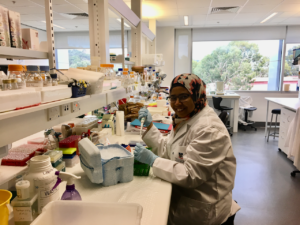
Attending ASPS 2021 (Australian Society of Plant Scientists) was a rewarding and memorable experience. I am Lina Herliana, an international student from Burton Lab at the University of Adelaide. I have studied the molecular mechanism underlying Plantago ovata (psyllium) seed and fruit development since mid-July 2018 under the supervision of Prof Rachel Burton, Dr Tina Bianco-Miotto and Dr Nathan Watson-Haigh. I would like to express my gratitude and appreciation to the University of Adelaide for sponsoring me with a generous scholarship and Prof Rachel Burton for supporting all my PhD projects, including attending this meeting. ASPS conference in 2021 was unique because it was a hybrid conference. Each state has in-person presentations on the same days, including Adelaide, on 25-26th November at National Wine Centre. Due to the Covid-19 pandemic restriction, we could not gather in one place as the previous year. However, I was still delighted because I had a chance to attend a face-to-face meeting in Adelaide during my final PhD year before returning to Indonesia. In total, there were 16 speakers and ten posters. Listening, learning, and talking about plant science was a thrilling experience. I was honoured that I had been selected to deliver a presentation. My talk was “De novo Genome Assembly and Annotation of Plantago ovata”. I explained the process of generating a reference genome and how we can use it to accelerate the P. ovata breeding program. This work was a foundation for studying the molecular mechanism behind mucilage production and shattering mechanisms.
Joanah Midzi, University of Adelaide.
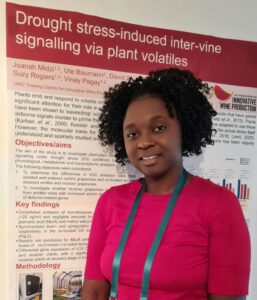
As a PhD candidate, supervised by Dr Vinay Pagay at the University of Adelaide, I had the privilege of attending the ASPS 2021 meeting. I was excited to have been selected to present a poster on my research study entitled: ‘Drought stress-induced inter-vine signalling via plant volatiles’. The main focus of my study is on the role of volatile organic compounds (VOCs) as chemical signal molecules facilitating plant communication in grapevine. Understanding the mechanisms involved in VOCmediated interactions and identifying the specific VOCs responsible for defence priming could underpin sustainable and eco-friendly plant-protection strategies against both biotic and abiotic stressors in agriculture. The opportunity to interact with other post-graduate students interested in plant communication, as well as networking with seasoned researchers in the field, made the symposium the ideal platform for scientific exchange, which I believe is very important for early-career researchers as myself. The highlight of the day for me at the conference was that I was able to showcase may research and receive great feedback from eminent scientists who had the chance to view my poster. I would like to extend my gratitude to the ASPS committee for the opportunity to attend the ASPS meeting and I look forward to attend similar conferences before completing my PhD studies. As an ASPS student member, I have been fortunate to be awarded an ASPS post-graduate travel grant to attend yet another exciting academic forum, ComBio 2022 (Melbourne), where I will once again present my results on a poster.
Zane Marks, Honours Student, University of Adelaide.
My name is Zane Marks and in 2021 I took part in the ASPS conference as an honour’s student, preparing both a poster and short talk. This being my first time presenting in a professional capacity, there was a lot of research into what information I needed to present and what to say. I presented my research on the effect of seed priming on hemp and barley germination. As I was near the end of honours this provided a good opportunity to get to know fellow researchers as well as find out what options were available to me post-graduation. There were some incredible insights from the GDRC about the acquisitions of scholarship. There were some very refreshing and realistic insights from university scholars into the future of both industry and academia. The presentations themselves were incredibly impressive ranging from AI developed recognition of organelles within a cell to the nutritional content of Plantago. As my poster went up there was no shortage of people curious about my work and my understanding of the significance of my results. This also gave me good insight into possible avenues for investigation as well as just general ideas both careerwise and how to handle myself in a professional setting. Overall the conference was a valuable insight into the future of research and what career paths are available to young scientists.
Lauren Philp-Dutton, Flinders University of South Australia.
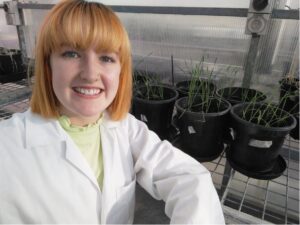
Last year I attended the ASPS conference at the National Wine Centre in Adelaide where I got the opportunity to present some of my research in the form of a poster. My PhD has focussed on mitochondrial alternative pathway and the role it plays in abiotic stress tolerance in bread wheat. It was great to be able to share some of my findings with other plant scientists and thank you to the APPF and ASPS for awarding me the best student poster! I also got the chance to co-chair one of the sessions which was something I had never done before and pushed me out of my comfort zone, but it turned out to be quite enjoyable as well as a great learning experience.
The conference was an excellent opportunity to talk and network with other researchers interested in plant science. I really enjoyed listening to the talks and looking at the different poster presentations on such a wide range of plant research. It’s amazing to see how broad of a field plant science really is. I also particularly enjoyed the EMCR plant science forum, its always so interesting to hear about how other scientists started and progressed in their research career, and the different pathways they have taken.
The ASPS did a fantastic job of hosting the conference during such a difficult time. If you can, I highly recommend attending the next ASPS conference next year in Tasmania!
Vanessa Tonet, PhD candidate, Discipline of Biological Sciences, University of Tasmania.
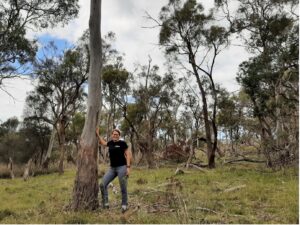
ASPS21 was the first conference I was allowed to attend in real person and I had the great opportunity to share some exciting results with other plant scientists in Hobart, Tasmania. I gave an oral talk that initiated a very stimulating conversation around leaf water transport system. As the environment is getting dried and drier, plants need to face more intense and more frequent drought events that impact their fitness and survival. We are now assisting to unprecedented rates of tree mortality. Understand how water moves through leaves and how they respond to dehydration is the major goal of my research.
This conference was a great opportunity to refine my skills as an oral presenter, and I’m glad the environment was friendly even if professional. At ASPS21, I was able to meet many scientists with different backgrounds but that can collaborate to bring together exciting discoveries, unravelling the fantastic world of plants.
Sam Henderson, Postdoctoral Researcher, School of Agriculture, Food and Wine, University of Adelaide.
The 2021 ASPS meeting was held at the National Wine Centre in Adelaide in November. This was the first time in two years that I attended a face-to-face conference due to the pandemic. It was good seeing many familiar faces in person and meeting several plant scientists who have moved to Adelaide recently.
I was fortunate to be selected to present unpublished research on the plant electroneutral cation-chloride cotransporters, which I first began studying at the University of Adelaide in 2010. Thanks to the ASPS and the local organising committee for their support and for giving me an opportunity to share my work.
Some highlights of the meeting included a great talk by Sunita Ramesh on the mechanisms of anion and GABA flux through the wheat ALMT1 protein, which is important for abiotic stress tolerance. Sunita has pioneered the rapidly expanding field of plant GABA research as it relates to ion channel function. Another interesting presentation was given by Jiaen Qiu, describing how water and ion conductivity of the aquaporin PIP2;1 is regulated, including the potential involvement of intracellular loop D. This would represent remarkable conservation between plants and animals, as the analogous loop D in human aquaporin-1 also regulates its activity.
The local organising committee, led by Megan Shelden, did a wonderful job delivering a high quality, professional symposium. I was pleased to re-join the Australian plant science community and was impressed by the kindness and inclusivity of our ASPS members.
See you in Melbourne soon ….. https://www.combio.org.au/combio2022/
#ComBio2022 The Programme Timetable, Plenary and Symposium Schedule’s are looking great.
Please login and check your ASPS membership is up to date. Encourage your colleagues and students to join ASPS.
Tweet to @asps_ozplants your news and upcoming events and follow to keep up to date.
Tickets for ASPS dinner during ComBio 2022
17 August 2022
Dear ASPS members,ASPS will hold a dinner for Society members during ComBio 2022 following our AGM on Thursday 29th September.This will be a two-course dinner including some drinks at Melbourne Public in the Docklands a short walk from the Conference venue.The ticket prices for members are subsidised by the Society:Students members for $30Other members for $60Additional tickets can be purchased for $90Tickets are limited, so don’t delay. Book today HERE.Please indicate any dietary requirements when booking your ticket.
Book ASPS dinner tickets HERE.
Recent Posts
Tags
Archives
- May 2025
- April 2025
- March 2025
- February 2025
- January 2025
- December 2024
- November 2024
- October 2024
- September 2024
- August 2024
- July 2024
- June 2024
- May 2024
- April 2024
- February 2024
- January 2024
- November 2023
- October 2023
- September 2023
- August 2023
- July 2023
- June 2023
- May 2023
- April 2023
- March 2023
- February 2023
- December 2022
- November 2022
- October 2022
- September 2022
- August 2022
- July 2022
- June 2022
- May 2022
- April 2022
- March 2022
- February 2022
- January 2022
- December 2021
- November 2021
- October 2021
- September 2021
- August 2021
- July 2021
- June 2021
- April 2021
- March 2021
- February 2021
- January 2021
- December 2020
- November 2020
- October 2020
- September 2020
- August 2020
- July 2020
- June 2020
- May 2020
- April 2020
- March 2020
- February 2020
- January 2020
- December 2019
- November 2019
- October 2019
- September 2019
- August 2019
- July 2019
- June 2019
- May 2019
- April 2019
- March 2019
- February 2019
- January 2019
- December 2018
- November 2018
- October 2018
- September 2018
- August 2018
- July 2018
- June 2018
- May 2018
- April 2018
- March 2018
- February 2018
- January 2018
- December 2017
- November 2017
- October 2017
- September 2017
- August 2017
- July 2017
- June 2017
- May 2017
- April 2017
- March 2017
- February 2017
- January 2017
- December 2016
- November 2016
- October 2016
- September 2016
- August 2016
- July 2016
- June 2016
- May 2016
- April 2016
- March 2016
- February 2016
- January 2016
- December 2015
- November 2015
- October 2015
- September 2015
- August 2015
- July 2015
- June 2015
- May 2015
- April 2015
- March 2015
- February 2015
- January 2015
- December 2014
- November 2014
- October 2014
- September 2014
- August 2014
- July 2014
- June 2014
Copyright 2017 Australian Society of Plant Scientists Disclaimer & Privacy
Website by Michael Major Media

